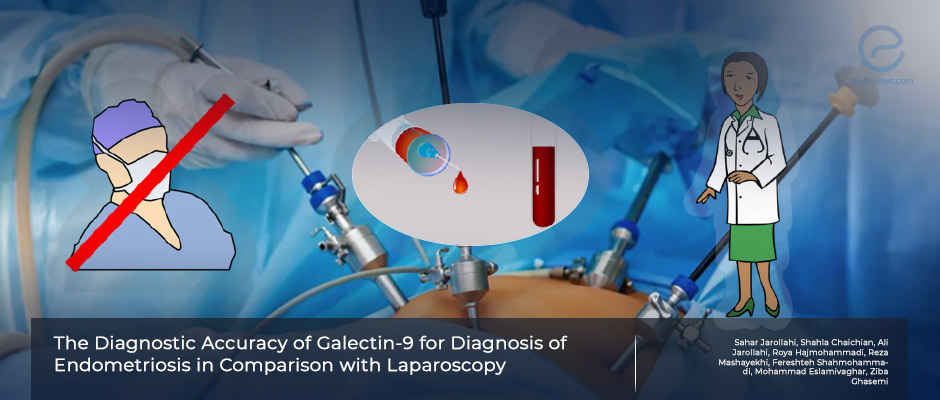Serum Galectin-9 : A promising marker for endometriosis diagnosis
Apr 12, 2023
Could it be possible to diagnose endometriosis via serum biomarkers ?
Key Points
Highlights:
- The gold standard diagnostic approach of endometriosis is the laparoscopic examination and biopsy evaluation. However, this may not be a practical step as a first-line diagnostic test, due to its financial burden and medical risks.
- Several galectins (β-galactoside binding lectins) are overexpressed in endometriotic tissue and also found in the peritoneal fluid of women with endometriosis.
Importance:
- Serum level of Galectin-9 compared with laparoscopic results for endometriosis diagnosis has been subject to a previous study with promising results. Further research utilizing a promising noninvasive marker for the diagnosis of endometriosis via Galectin-9 seems crucial in this regard.
What's done here:
- Thirty laparoscopically confirmed endometriosis patients and a control group of 26 patients were assigned in this study to compare serum Galectin-9 levels.
Key Results:
- The mean serum level of Galectin-9 was statistically significantly high in the endometriosis group compared to the control group, suggesting that serum Galectin-9 measurement is helpful in the diagnostic workup of endometriosis.
Potential limitations of the study:
- The subjective nature of some of the variables tested, like pain perception, depends on the patient’s threshold.
- The small sample size in the present study is explained by the conducting authors due to the high cost of Galectin-9 measurement in their country.
Lay Summary
Dr. Jarollahi and colleagues from Iran University of Medical Sciences, Tehran have published their research on serum levels of Galectin-9 as a noninvasive marker for endometriosis in the "Journal of Reproduction & Infertility".
Endometriosis imposes a great challenge in the current diagnostic algorithm where it is still the gold standard to visualize directly via laparoscopic examination, which is not feasible as a first-line approach due to its costs and risks.
Galectins are members of β-galactoside binding lectins, homologous with an amino acid sequence of the carbohydrate-binding site, a group of proteins highly prone to glycosylation. Several galectins (β-galactoside binding lectins) are overexpressed in endometriotic tissue and also found in the peritoneal fluid of women with endometriosis. Among these, Galectin-9 serum level has been tested in one preliminary study as a noninvasive marker with promising results.
Among patients referred to Iran University of Medical Sciences in Tehran, those who had suspected endometriosis (including patients with symptoms of dysmenorrhea, dyspareunia, dyschezia, and dysuria) which was recommended for laparoscopic examination for definitive diagnosis were considered as the case group (n=32); and women who underwent laparoscopy for any reason other than endometriosis were considered as the control group (n=29).
The mean serum level of Galectin-9 was significantly higher in the endometriosis group compared to the control group, suggesting that serum Galectin-9 measurement is helpful in the diagnostic workup of endometriosis. The authors suggest that not only the serum level of Galectin-9 may be a strong predictor of endometriosis, but the effect of the stages of the disease should be examined additionally.
The authors also admit the two limitations of this study, such as the subjective nature of some of the variables tested like pain perception, depending on the patient’s threshold. Additionally, the small sample size in the present study is explained by the authors as due to the cost of Galectin-9 measurement with respect to their current local conditions.
As a final remark the authors conclude that serum Galectin-9 measurement is helpful in diagnosing endometriosis as a noninvasive test and future studies are encouraged in this regard.
Research Source: https://pubmed.ncbi.nlm.nih.gov/36452187/
endometriosis diagnosis noninvasive test Galectins Galectin-9

